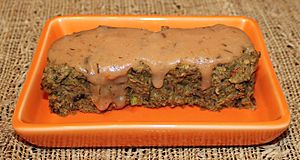Nutraloaf facts for kids

A vegetable-based nutraloaf with sauce
|
|
| Alternative names | Meal Loaf, prison loaf, disciplinary loaf, food loaf, lockup loaf, confinement loaf, seg loaf, grue, special management meal, vomit loaf, punishment loaf, The loaf |
|---|---|
| Type | Meal |
| Course | Main |
| Place of origin | United States, Canada |
| Serving temperature | Room Temperature |
Nutraloaf (also known as meal loaf or prison loaf) is a special type of food served in prisons. It is given to inmates (people in prison) who have broken rules, like misbehaving. This food is similar to meatloaf in how it feels to eat, but it has many different ingredients.
Prison officials say nutraloaf provides all the nutrition prisoners need to stay healthy. It is also designed so that prisoners do not need forks or spoons to eat it. However, many people argue that nutraloaf is unpleasant to eat and should not be used as a form of punishment.
How is Nutraloaf Made?
Nutraloaf is made from a mix of different foods. These can include vegetables, fruits, meat, and bread or other grains. All the ingredients are blended together until they form a paste. Then, this paste is baked into a solid loaf.
Some recipes for nutraloaf use ground beef, vegetables, beans, and bread crumbs. Other versions might include poultry (like chicken or turkey) and dairy products.
Is Nutraloaf Fair?
The use of nutraloaf in prisons is a big topic of discussion. Many people wonder if it is fair to give this kind of food as a punishment.
In the United States, courts have looked at whether nutraloaf is a "cruel and unusual punishment". This means treatment that is too harsh or unfair under the law.
The American Correctional Association, which sets standards for prisons, does not encourage using food as a way to punish people. They believe that denying proper meals as punishment is wrong. However, prisons often argue that nutraloaf is not denying food, but rather a "dietary adjustment" because it still provides all the necessary nutrients.
Court Cases About Nutraloaf
Many lawsuits have been filed about nutraloaf in different states, including Illinois, Maryland, Nebraska, New York, Pennsylvania, Washington, and West Virginia.
- In 1978, the Supreme Court of the United States looked at a similar food called "grue" in an Arkansas prison. The court decided that feeding prisoners "grue" was too harsh and ordered it to stop.
- In 2008, prisoners in Vermont argued that their state law does not allow food to be used as punishment. The Vermont Supreme Court agreed that nutraloaf was a punishment because it was made to be unappetizing. So, they ordered it to be removed from the menu.
- In 2010, a sheriff in Maricopa County, Arizona, Joe Arpaio, won a court case that said nutraloaf was allowed in his prisons.
- In 2015, New York State decided to stop using nutraloaf in all its prisons.
- A court in Washington ruled that while nutraloaf was not "cruel and unusual," it was still a punishment. This meant prisoners should have a fair chance to explain their side (a "due process hearing") before being given nutraloaf.

